8下Unit1 Past and present Grammar课件
文档属性
| 名称 | 8下Unit1 Past and present Grammar课件 | 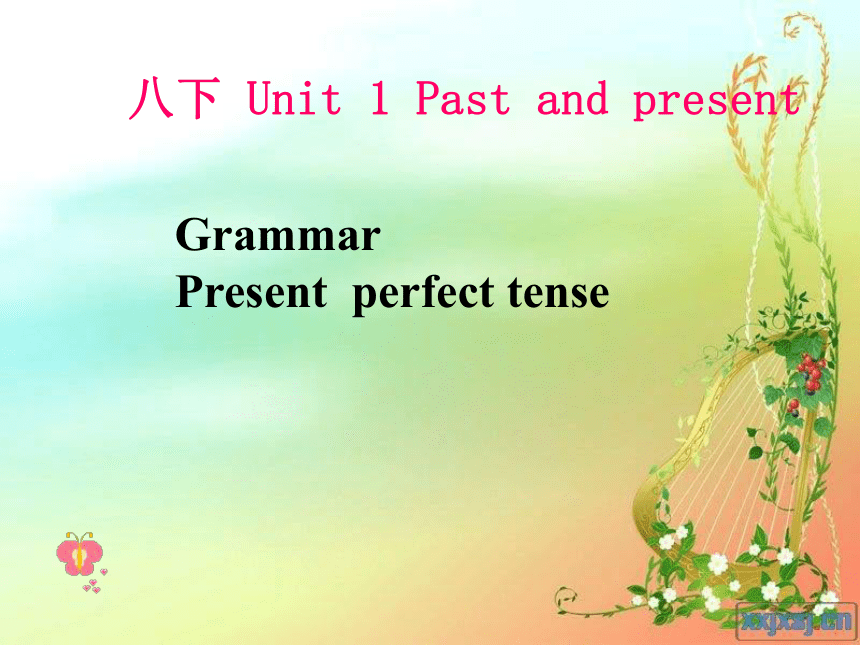 | |
| 格式 | zip | ||
| 文件大小 | 442.0KB | ||
| 资源类型 | 教案 | ||
| 版本资源 | 牛津译林版 | ||
| 科目 | 英语 | ||
| 更新时间 | 2016-02-29 18:41:05 | ||
图片预览

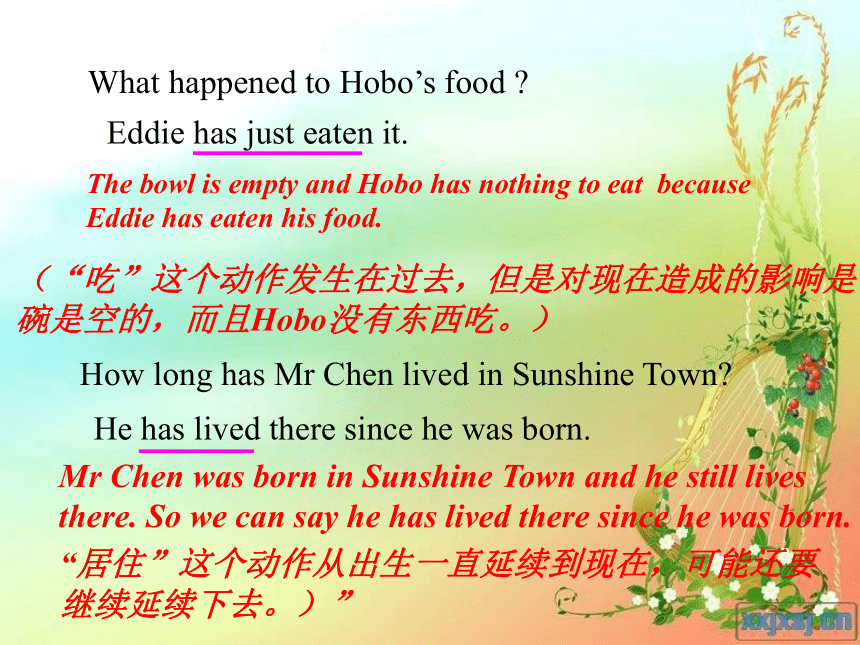
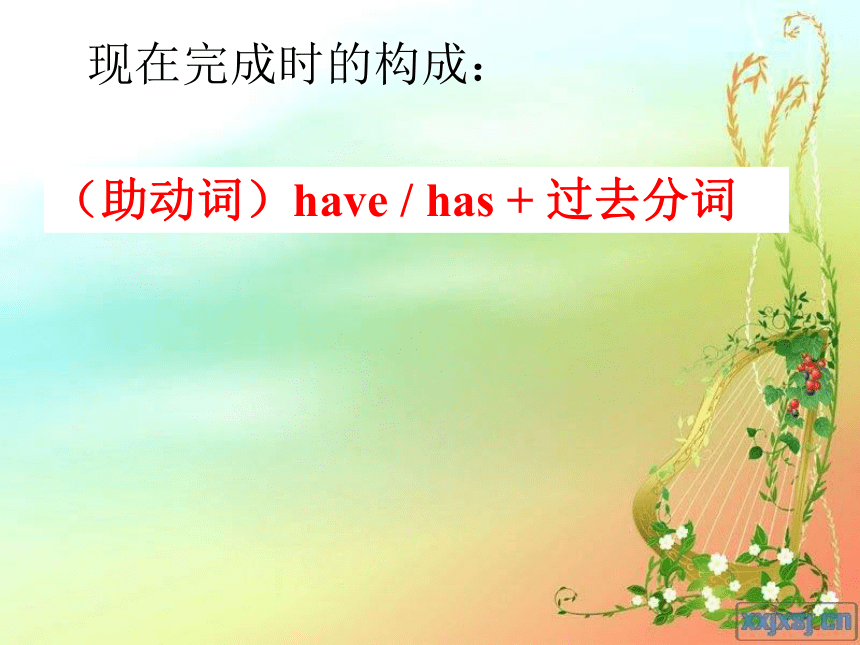
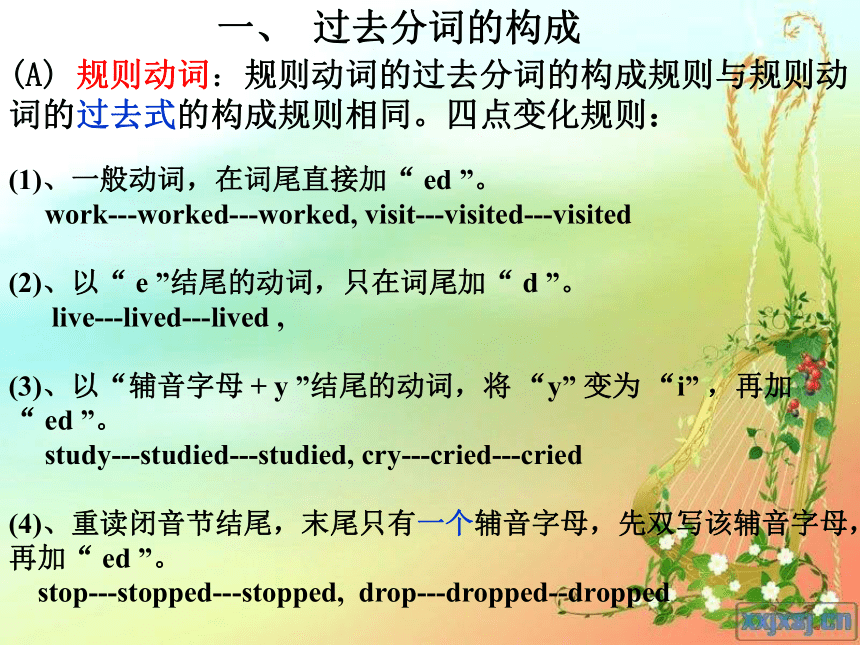
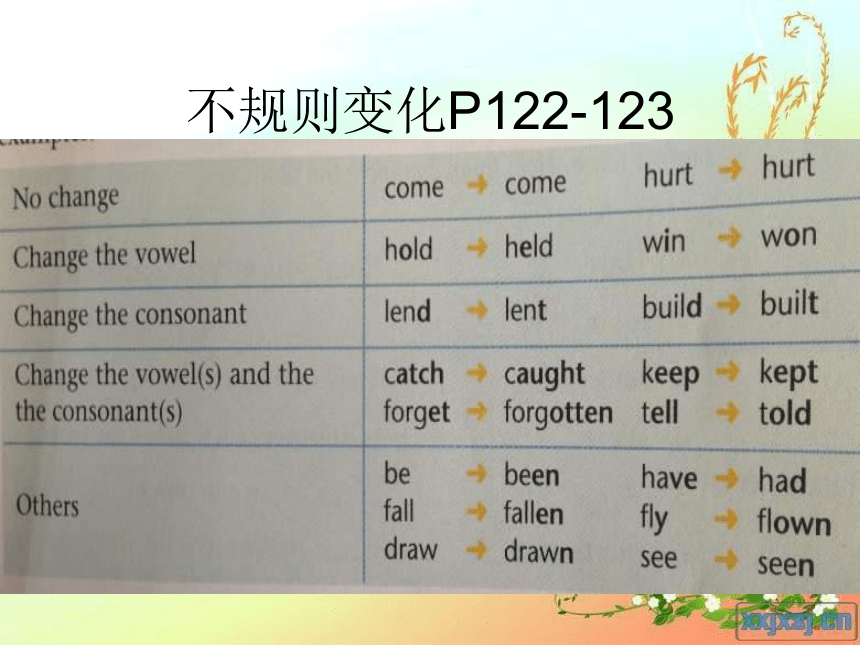
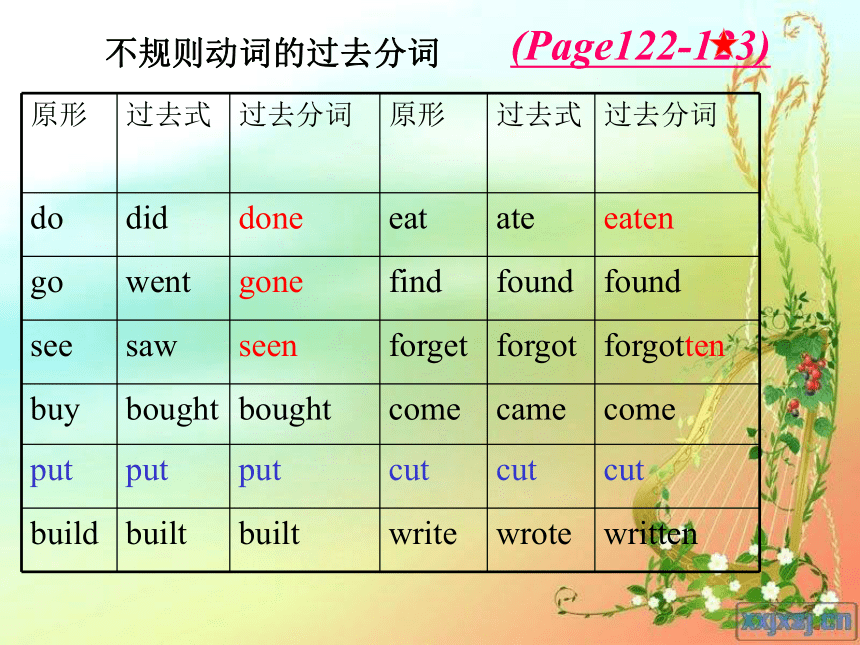
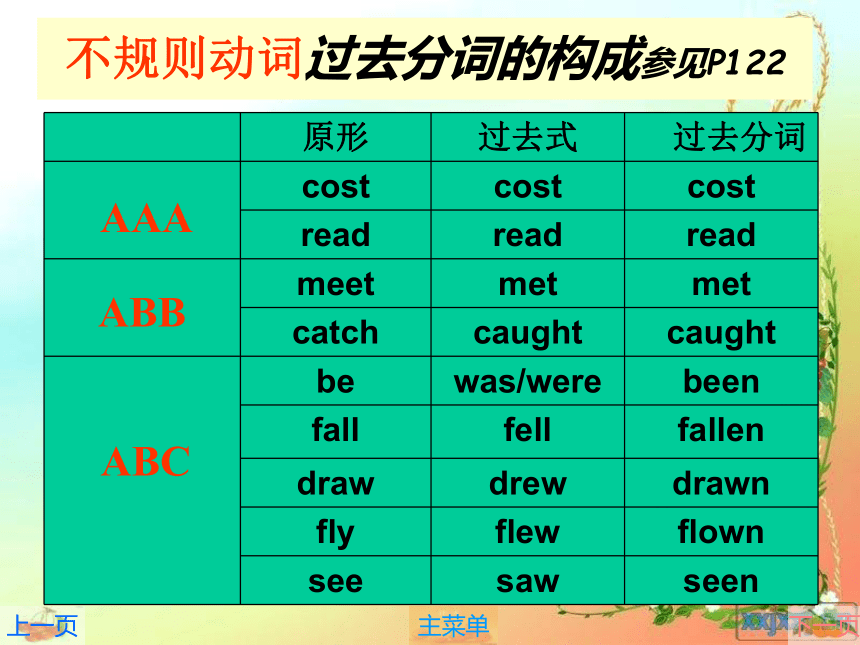
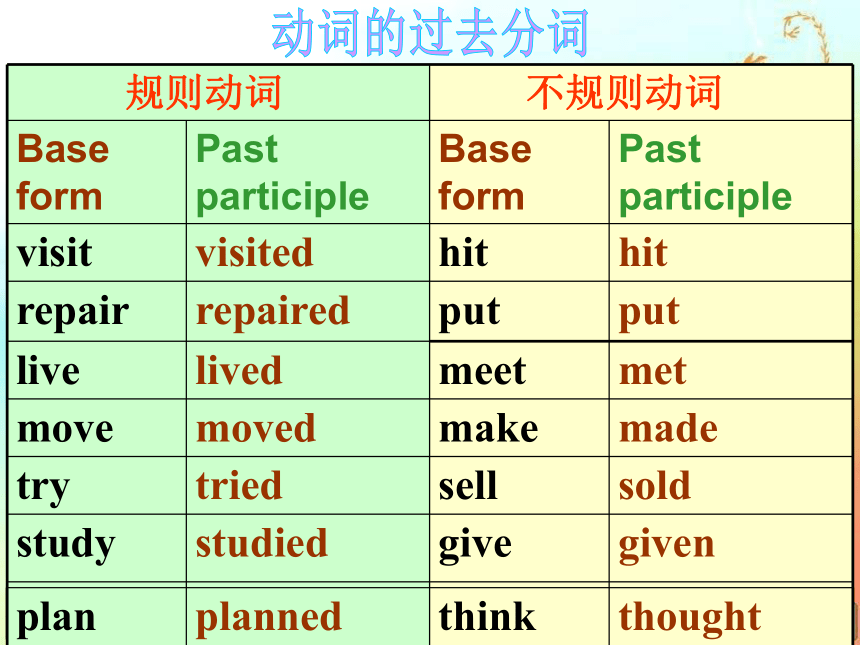
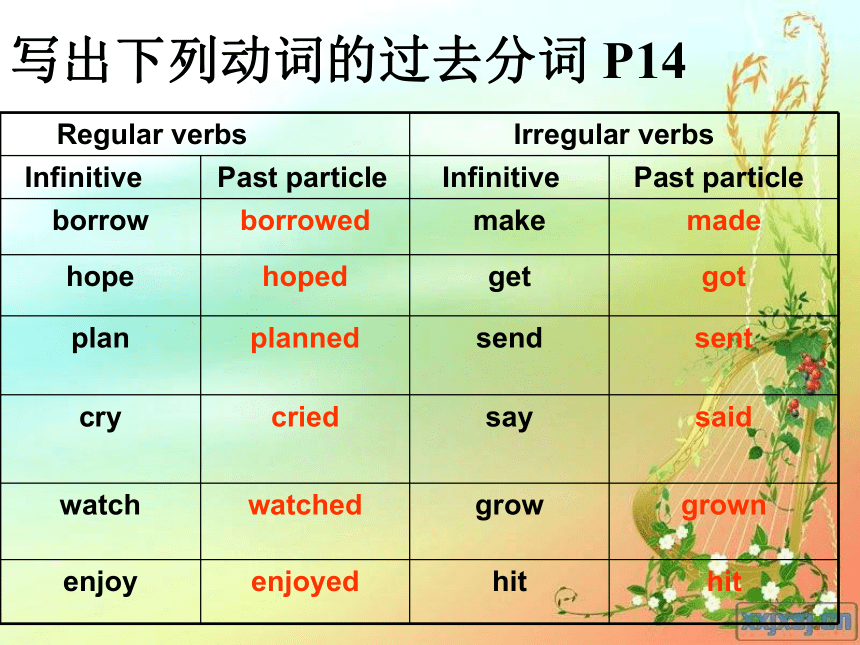

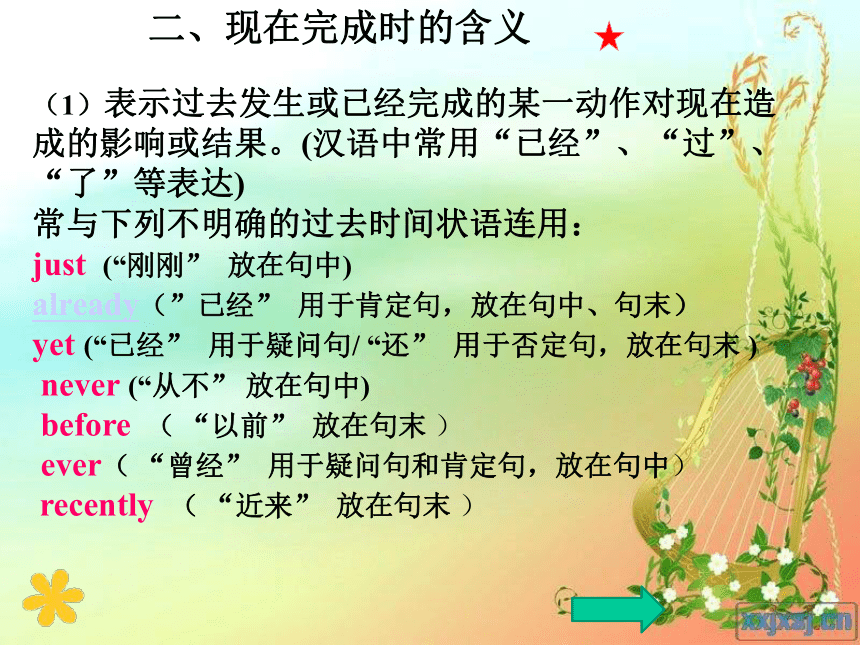

文档简介
课件38张PPT。八下 Unit 1 Past and present
Grammar
Present perfect tenseWhat happened to Hobo’s food ?Eddie has just eaten it.How long has Mr Chen lived in Sunshine Town?He has lived there since he was born.The bowl is empty and Hobo has nothing to eat because Eddie has eaten his food.(“吃”这个动作发生在过去,但是对现在造成的影响是:
碗是空的,而且Hobo没有东西吃。)Mr Chen was born in Sunshine Town and he still lives
there. So we can say he has lived there since he was born.“居住”这个动作从出生一直延续到现在,可能还要
继续延续下去。)”现在完成时的构成:(助动词)have / has + 过去分词一、 过去分词的构成(A) 规则动词:规则动词的过去分词的构成规则与规则动词的过去式的构成规则相同。四点变化规则: (1)、一般动词,在词尾直接加“ ed ”。
work---worked---worked, visit---visited---visited
(2)、以“ e ”结尾的动词,只在词尾加“ d ”。
live---lived---lived ,
(3)、以“辅音字母 + y ”结尾的动词,将 “y” 变为 “i” ,再加“ ed ”。
study---studied---studied, cry---cried---cried
(4)、重读闭音节结尾,末尾只有一个辅音字母,先双写该辅音字母,再加“ ed ”。
stop---stopped---stopped, drop---dropped--dropped
不规则变化P122-123 不规则动词的过去分词(Page122-123)不规则动词过去分词的构成参见P122上一页下一页ABBAAA ABC主菜单动词的过去分词写出下列动词的过去分词 P14Exercise 1:
bring
buy
fall
feel
speak
think
writebrought brought
bought bought
fell fallen
felt felt
spoke spoken
thought thought
wrote written二、现在完成时的含义(1)表示过去发生或已经完成的某一动作对现在造成的影响或结果。(汉语中常用“已经”、“过”、“了”等表达)
常与下列不明确的过去时间状语连用:
just (“刚刚” 放在句中)
already(”已经” 用于肯定句,放在句中、句末)
yet (“已经” 用于疑问句/ “还” 用于否定句,放在句末 )
never (“从不” 放在句中)
before ( “以前” 放在句末 )
ever( “曾经” 用于疑问句和肯定句,放在句中)
recently ( “近来” 放在句末 ) 当在肯定陈述句中含有already,在转换成否定句或疑问句时,要把句中的already 去掉,在句末加上yet. I haven’t seen the film yet.● I have done my homework already.I haven’t done my homework yet.● I have seen the film already. 1. He has _________ visited many ?places in China.
?? ?
2. The train hasn’t arrived _________.
3. Has she arrived _________ ? ?
4. Hasn’t he come back_________ ?alreadyyet yet yet Tip:
“already” 可用在句中. “ yet” 只用在句末Practice: 用“already” “yet”填空1.Eddie has just eaten my food. (Eddie刚吃了我的食物。)
2.I have never heard of that before.(我以前从未听说过那件事)
3. Have you ever ridden a horse?(你曾经骑过马吗?)
4.She has already finished the work.
(她已经完成这个工作了。)
5.We haven’t finished our homework yet.
(我们还没有完成作业呢。)
6. Have you seen any films recently?
你近来看过电影吗?
(2)表示过去的动作或状态一直延续到现在,也许还会持续下去。常与表示延续的时间状语连用。 如for、since 等引导的时间状语。(注意:句中谓语动词要用延续性动词)1.Eddie has lived with Millie for 4 years.2.Eddie has lived with Milliesince he was born.since 2008for: + 一段时间 for a year, for two weeks, for three years...
过去的某一时刻, since last week, since 2008…
Since 一段时间+ago, since 9 years ago, since 3 days ago…,
+点时间 从句(从句时态为一般过去时):since you came,
since he moved here, since I was born…
since 4 years ago.Let’ try!用since或for填空:
1.I have been at this school ____________ more than two years.
2. She has worked in the factory ___________ ten years ago.
3. Mr. Green has lived in the city ____________ he was born.
4. His father has been a party member ___________ twenty years.
forforsincesince定义3:到目前为止动作已经发生许多次I have already read this book many times三、现在完成时的各种句式(1)肯定句:I/We/You/They + 助动词have + p.p(过去分词)+其它。
He/She/It + 助动词has + p.p(过去分词)+其它。e.g.
They ______________ their homework. (finish)
He ______________his homework. (finish)have finished
has finished(2)否定句I/We/You/They+have not / haven’t +p.p(过去分词)+其它。
He/She/It +has not / hasn’t +p.p(过去分词)+其它。e.g.
They _______________ their homework yet (还未). (finish)
He _______________ his homework yet. (finish)haven’t finished
hasn’t finished(3)一般疑问句及回答---Have+I/you/we/they+p.p(过去分词)+其它?
---Yes, I/you/we/they have.
---No, I/you/we/they haven’t.
---Has +she/he/it+p.p(过去分词) +其它?
---Yes, she/he/it has.
---No, she/he/it hasn’t.
e.g.
_______you _______the film?(watch)
Yes, I _______.
_______your father ________the film?(watch)
No, he _______.Have watched
haveHas watched
hasn’t (4)特殊疑问句特殊疑问词+have/has+主语+p.p(过去分词)+其它?e.g.
The girl has learned English for 6 years.
I have eaten two apples for breakfast.
How long has the girl learned English?
What have you eaten for breakfast?
Completing the sentences (Page 14):1.They ____________(finish) their homework already.
2. John ________ never ________(visit) China.
3. Mr Li __________(repair) over ten bicycles since last
Monday.
4. We ____________(not see) each other for years.
5. My parents ____________(not come) back yet?
6. Our teacher ____________(teach) us a lot about the history
of China .
Keys: 1.have finished 2. have visited 3. has repaired
4. haven’t seen 5. hasn’t come 6. have taughtChat time (Page 14):Millie: (1)_____ you ____(see) any films recently, Sandy?
Sandy: No, I haven’t. What about you?
Millie: I (2)________(see) one last Saturday.
Sandy: What’s it about?
Millie: It’s about the changes in Beijing over the past century(世纪). From this film, I __________ (learn) more about Beijing’s past and present.
Sandy: Oh, I think I (5)__________(hear) about it. Do you plan to see it again?
Millie: Yes, I’d like to.
Have seensawhave learnthave heard四、现在完成时与一般过去时的区别现在完成时表示过去的动作一直延续到现在甚至会继续下去或表示过去的动作对现在造成的影响;一般过去时表示动作发生的时间在过去。试比较:
The plane has arrived . 飞机已经来了。(说明现在的情况:飞机在这儿)
The plane arrived a quarter ago. 飞机是一刻中以前来的。(强调动作发生的时间在过去)
I have taught here for fifteen years. 我在这儿已经教了十五年。(表示十五年前的动作一直延续到现在,还可能会继续。)
I taught here for a year. 我过去在这儿教过一年。(表示“我“现在已经不在这儿任教了)。
I bought a new computer last week.——强调买电脑时间在上周。
I have bought a new computer.——不强调什么时候买电脑的,只强调现在的结果是拥有了一台新电脑。四、现在完成时与一般过去时的区别
一般过去时常与具体的过去时间状语连用,而现在完成时通常与模糊的时间状语连用,或无时间状语。
◎ 一般过去时的时间状语有:yesterday, last week,…ago, in1980, in October, just now等具体的时间状语。
◎ 现在完成时的时间状语有:for, since, ever, never, just, already, yet, in/during /over the past/last few years,over these years, so far, recently,before等不确定的时间状语。
Let’s try! I’m sure you can do it well!1.I _________(see) the 3D film Avatar. It’s amazing!
I _________(see) it one month ago. 2.--Is your grandfather still alive? --No, he _____already ______(die).
--When _______he _______(die)? --He _______last year(die). 3.I _______just _______ (hear) of the earthquake in Tangshan.
--The earthquake?
--Yes, it _________(happen) on March 6th, three days ago.4.Mr. Li _______(begin) to work in this factory in 1990.
He ___________ (work) in the factory for 20 years.5. The Greens _________(live) in China since
they _______(move) here in 2003.have seensawhas dieddid diediedhave heardhappenedbeganhas workedhas livedmovedLet’s try!1. She has already cleaned the kitchen. (改为否定句)
→She __________ cleaned the kitchen ___________.
2. They have visited some interesting places in China. (改为一般疑问句)
→___________ they _____________ ___________ interesting places in China?
3. The poor dog has died.(改为一般疑问句并作否定回答)
→_________the poor dog _________? -No, it __________.
4. They have borrowed ten books from the library. (对划线部分提问)
→_________ _________books __________ they _________ from the library?
5. I have ever been to the Great Wall. (改为否定句)
I ________ ________ been to the Great Wall.
6. They have studied here since they moved to the city. (对划线部分提问)
___________ ___________ _________ they _________ here?
hasn’t yetHave visited anyHas died hasn’tHow many have borrowedhave neverHow long have studied — _______ you ever _______ with a
group?
— Yes, I have.
A. Did, study B. Are, studying
C. Were, studying D. Have, studied
2. — Lucy, _____ you ____ your ticket?
— Not yet.
A. did; find B. have; found
C. has; found D. do; findI. Multiple choice.3. My grandmother ______ a lot of
changes in Tianjin since she came here.
(2011天津)
A. sees B. can see
C. will see D. has seen
4. My aunt is a writer. She ______ more
than ten books since 1980. (2011北京)
A. writes B. wrote
C. has written D. will write 5. — Why won’t you go to the movie with
me, Gina?
— Because I ______ it twice. (2011襄阳)
A. see B. have seen
C. saw D. will see
6. — China develops so fast.
— That’s true. It ______ a lot already.
(2011安徽芜湖)
A. changes B. changed
C. will change D. has changed 7. — I’d like to introduce my best friend
to you, Peter.
— Thank you, Lucy. But we ______
already. (2012河南)
A. meet B. met
C. will meet D. have met
8. Since 2000, Jingmen has become a new
city. Everything ______. (2013湖北荆州) A. is changed?????? ?B. was changed????
?C. had changed????D. has changed 9. Julia isn’t going to the cinema with us
because she ______ the film.
(2013浙江湖州)
A. sees?? ?? B. saw?? ??
C. will see??? ?? D. has seen
10. — Look at these stamps. I _______
them for five years. ??? — Wow, they are wonderful. (2013湖南衡阳) ??
A. kept??????? B. have kept??????????
C. have bought1. I ________ (have) dinner. I am full.
2. We _________ (read) this story.
3. They ________ (see) the movie.
4. She __________ (buy) some nice toys.
5. Hurry up! Lunch _____ already
______ (begin).
6. We ___________ (wash) our clothes.
They’re clean now.
7. _____ he ever _______ (ride) a bike? have had have readhave seenhas bought have washedII. Fill in the blanks.Has riddenhasbegunIV. Put the following sentences into English.1. 你已经制作好生日贺卡了吗?
______ _______ __________ making
the birthday card ______?
2. 我已经吃过早饭了,现在一点也不饿。
I _______ _______ ________ breakfast,
and now I am not hungry at all.
3. — 你这周日准备做什么?— 还没决定。
— What are you going to do this Sunday?
— I _______ ________ ___. have already eatenHave you finishedyet haven’t decided yet 4. — 你读过《哈利·波特》这本书么?
— 是的,我已经读过好多遍了。
— _____ you _____ the book Harry
Porter?
— Yes, I _____ _______ ______ it
several times.
5. 自从1978年以来,他一直住在这儿。
He _____ _____ here since 1978. Have read have already read has livedConclusion:
现在完成时的含义
现在完成时的构成
现在完成时过去分词的构成
现在完成时与一般过去时的区别Homework:
1.朗读课本对话。
2.背诵不规则动词的过去分词。
3 预习课本P15-16.That’s all for today!
Thanks for listening!
Have a nice day!
Bye!
Grammar
Present perfect tenseWhat happened to Hobo’s food ?Eddie has just eaten it.How long has Mr Chen lived in Sunshine Town?He has lived there since he was born.The bowl is empty and Hobo has nothing to eat because Eddie has eaten his food.(“吃”这个动作发生在过去,但是对现在造成的影响是:
碗是空的,而且Hobo没有东西吃。)Mr Chen was born in Sunshine Town and he still lives
there. So we can say he has lived there since he was born.“居住”这个动作从出生一直延续到现在,可能还要
继续延续下去。)”现在完成时的构成:(助动词)have / has + 过去分词一、 过去分词的构成(A) 规则动词:规则动词的过去分词的构成规则与规则动词的过去式的构成规则相同。四点变化规则: (1)、一般动词,在词尾直接加“ ed ”。
work---worked---worked, visit---visited---visited
(2)、以“ e ”结尾的动词,只在词尾加“ d ”。
live---lived---lived ,
(3)、以“辅音字母 + y ”结尾的动词,将 “y” 变为 “i” ,再加“ ed ”。
study---studied---studied, cry---cried---cried
(4)、重读闭音节结尾,末尾只有一个辅音字母,先双写该辅音字母,再加“ ed ”。
stop---stopped---stopped, drop---dropped--dropped
不规则变化P122-123 不规则动词的过去分词(Page122-123)不规则动词过去分词的构成参见P122上一页下一页ABBAAA ABC主菜单动词的过去分词写出下列动词的过去分词 P14Exercise 1:
bring
buy
fall
feel
speak
think
writebrought brought
bought bought
fell fallen
felt felt
spoke spoken
thought thought
wrote written二、现在完成时的含义(1)表示过去发生或已经完成的某一动作对现在造成的影响或结果。(汉语中常用“已经”、“过”、“了”等表达)
常与下列不明确的过去时间状语连用:
just (“刚刚” 放在句中)
already(”已经” 用于肯定句,放在句中、句末)
yet (“已经” 用于疑问句/ “还” 用于否定句,放在句末 )
never (“从不” 放在句中)
before ( “以前” 放在句末 )
ever( “曾经” 用于疑问句和肯定句,放在句中)
recently ( “近来” 放在句末 ) 当在肯定陈述句中含有already,在转换成否定句或疑问句时,要把句中的already 去掉,在句末加上yet. I haven’t seen the film yet.● I have done my homework already.I haven’t done my homework yet.● I have seen the film already. 1. He has _________ visited many ?places in China.
?? ?
2. The train hasn’t arrived _________.
3. Has she arrived _________ ? ?
4. Hasn’t he come back_________ ?alreadyyet yet yet Tip:
“already” 可用在句中. “ yet” 只用在句末Practice: 用“already” “yet”填空1.Eddie has just eaten my food. (Eddie刚吃了我的食物。)
2.I have never heard of that before.(我以前从未听说过那件事)
3. Have you ever ridden a horse?(你曾经骑过马吗?)
4.She has already finished the work.
(她已经完成这个工作了。)
5.We haven’t finished our homework yet.
(我们还没有完成作业呢。)
6. Have you seen any films recently?
你近来看过电影吗?
(2)表示过去的动作或状态一直延续到现在,也许还会持续下去。常与表示延续的时间状语连用。 如for、since 等引导的时间状语。(注意:句中谓语动词要用延续性动词)1.Eddie has lived with Millie for 4 years.2.Eddie has lived with Milliesince he was born.since 2008for: + 一段时间 for a year, for two weeks, for three years...
过去的某一时刻, since last week, since 2008…
Since 一段时间+ago, since 9 years ago, since 3 days ago…,
+点时间 从句(从句时态为一般过去时):since you came,
since he moved here, since I was born…
since 4 years ago.Let’ try!用since或for填空:
1.I have been at this school ____________ more than two years.
2. She has worked in the factory ___________ ten years ago.
3. Mr. Green has lived in the city ____________ he was born.
4. His father has been a party member ___________ twenty years.
forforsincesince定义3:到目前为止动作已经发生许多次I have already read this book many times三、现在完成时的各种句式(1)肯定句:I/We/You/They + 助动词have + p.p(过去分词)+其它。
He/She/It + 助动词has + p.p(过去分词)+其它。e.g.
They ______________ their homework. (finish)
He ______________his homework. (finish)have finished
has finished(2)否定句I/We/You/They+have not / haven’t +p.p(过去分词)+其它。
He/She/It +has not / hasn’t +p.p(过去分词)+其它。e.g.
They _______________ their homework yet (还未). (finish)
He _______________ his homework yet. (finish)haven’t finished
hasn’t finished(3)一般疑问句及回答---Have+I/you/we/they+p.p(过去分词)+其它?
---Yes, I/you/we/they have.
---No, I/you/we/they haven’t.
---Has +she/he/it+p.p(过去分词) +其它?
---Yes, she/he/it has.
---No, she/he/it hasn’t.
e.g.
_______you _______the film?(watch)
Yes, I _______.
_______your father ________the film?(watch)
No, he _______.Have watched
haveHas watched
hasn’t (4)特殊疑问句特殊疑问词+have/has+主语+p.p(过去分词)+其它?e.g.
The girl has learned English for 6 years.
I have eaten two apples for breakfast.
How long has the girl learned English?
What have you eaten for breakfast?
Completing the sentences (Page 14):1.They ____________(finish) their homework already.
2. John ________ never ________(visit) China.
3. Mr Li __________(repair) over ten bicycles since last
Monday.
4. We ____________(not see) each other for years.
5. My parents ____________(not come) back yet?
6. Our teacher ____________(teach) us a lot about the history
of China .
Keys: 1.have finished 2. have visited 3. has repaired
4. haven’t seen 5. hasn’t come 6. have taughtChat time (Page 14):Millie: (1)_____ you ____(see) any films recently, Sandy?
Sandy: No, I haven’t. What about you?
Millie: I (2)________(see) one last Saturday.
Sandy: What’s it about?
Millie: It’s about the changes in Beijing over the past century(世纪). From this film, I __________ (learn) more about Beijing’s past and present.
Sandy: Oh, I think I (5)__________(hear) about it. Do you plan to see it again?
Millie: Yes, I’d like to.
Have seensawhave learnthave heard四、现在完成时与一般过去时的区别现在完成时表示过去的动作一直延续到现在甚至会继续下去或表示过去的动作对现在造成的影响;一般过去时表示动作发生的时间在过去。试比较:
The plane has arrived . 飞机已经来了。(说明现在的情况:飞机在这儿)
The plane arrived a quarter ago. 飞机是一刻中以前来的。(强调动作发生的时间在过去)
I have taught here for fifteen years. 我在这儿已经教了十五年。(表示十五年前的动作一直延续到现在,还可能会继续。)
I taught here for a year. 我过去在这儿教过一年。(表示“我“现在已经不在这儿任教了)。
I bought a new computer last week.——强调买电脑时间在上周。
I have bought a new computer.——不强调什么时候买电脑的,只强调现在的结果是拥有了一台新电脑。四、现在完成时与一般过去时的区别
一般过去时常与具体的过去时间状语连用,而现在完成时通常与模糊的时间状语连用,或无时间状语。
◎ 一般过去时的时间状语有:yesterday, last week,…ago, in1980, in October, just now等具体的时间状语。
◎ 现在完成时的时间状语有:for, since, ever, never, just, already, yet, in/during /over the past/last few years,over these years, so far, recently,before等不确定的时间状语。
Let’s try! I’m sure you can do it well!1.I _________(see) the 3D film Avatar. It’s amazing!
I _________(see) it one month ago. 2.--Is your grandfather still alive? --No, he _____already ______(die).
--When _______he _______(die)? --He _______last year(die). 3.I _______just _______ (hear) of the earthquake in Tangshan.
--The earthquake?
--Yes, it _________(happen) on March 6th, three days ago.4.Mr. Li _______(begin) to work in this factory in 1990.
He ___________ (work) in the factory for 20 years.5. The Greens _________(live) in China since
they _______(move) here in 2003.have seensawhas dieddid diediedhave heardhappenedbeganhas workedhas livedmovedLet’s try!1. She has already cleaned the kitchen. (改为否定句)
→She __________ cleaned the kitchen ___________.
2. They have visited some interesting places in China. (改为一般疑问句)
→___________ they _____________ ___________ interesting places in China?
3. The poor dog has died.(改为一般疑问句并作否定回答)
→_________the poor dog _________? -No, it __________.
4. They have borrowed ten books from the library. (对划线部分提问)
→_________ _________books __________ they _________ from the library?
5. I have ever been to the Great Wall. (改为否定句)
I ________ ________ been to the Great Wall.
6. They have studied here since they moved to the city. (对划线部分提问)
___________ ___________ _________ they _________ here?
hasn’t yetHave visited anyHas died hasn’tHow many have borrowedhave neverHow long have studied — _______ you ever _______ with a
group?
— Yes, I have.
A. Did, study B. Are, studying
C. Were, studying D. Have, studied
2. — Lucy, _____ you ____ your ticket?
— Not yet.
A. did; find B. have; found
C. has; found D. do; findI. Multiple choice.3. My grandmother ______ a lot of
changes in Tianjin since she came here.
(2011天津)
A. sees B. can see
C. will see D. has seen
4. My aunt is a writer. She ______ more
than ten books since 1980. (2011北京)
A. writes B. wrote
C. has written D. will write 5. — Why won’t you go to the movie with
me, Gina?
— Because I ______ it twice. (2011襄阳)
A. see B. have seen
C. saw D. will see
6. — China develops so fast.
— That’s true. It ______ a lot already.
(2011安徽芜湖)
A. changes B. changed
C. will change D. has changed 7. — I’d like to introduce my best friend
to you, Peter.
— Thank you, Lucy. But we ______
already. (2012河南)
A. meet B. met
C. will meet D. have met
8. Since 2000, Jingmen has become a new
city. Everything ______. (2013湖北荆州) A. is changed?????? ?B. was changed????
?C. had changed????D. has changed 9. Julia isn’t going to the cinema with us
because she ______ the film.
(2013浙江湖州)
A. sees?? ?? B. saw?? ??
C. will see??? ?? D. has seen
10. — Look at these stamps. I _______
them for five years. ??? — Wow, they are wonderful. (2013湖南衡阳) ??
A. kept??????? B. have kept??????????
C. have bought1. I ________ (have) dinner. I am full.
2. We _________ (read) this story.
3. They ________ (see) the movie.
4. She __________ (buy) some nice toys.
5. Hurry up! Lunch _____ already
______ (begin).
6. We ___________ (wash) our clothes.
They’re clean now.
7. _____ he ever _______ (ride) a bike? have had have readhave seenhas bought have washedII. Fill in the blanks.Has riddenhasbegunIV. Put the following sentences into English.1. 你已经制作好生日贺卡了吗?
______ _______ __________ making
the birthday card ______?
2. 我已经吃过早饭了,现在一点也不饿。
I _______ _______ ________ breakfast,
and now I am not hungry at all.
3. — 你这周日准备做什么?— 还没决定。
— What are you going to do this Sunday?
— I _______ ________ ___. have already eatenHave you finishedyet haven’t decided yet 4. — 你读过《哈利·波特》这本书么?
— 是的,我已经读过好多遍了。
— _____ you _____ the book Harry
Porter?
— Yes, I _____ _______ ______ it
several times.
5. 自从1978年以来,他一直住在这儿。
He _____ _____ here since 1978. Have read have already read has livedConclusion:
现在完成时的含义
现在完成时的构成
现在完成时过去分词的构成
现在完成时与一般过去时的区别Homework:
1.朗读课本对话。
2.背诵不规则动词的过去分词。
3 预习课本P15-16.That’s all for today!
Thanks for listening!
Have a nice day!
Bye!
